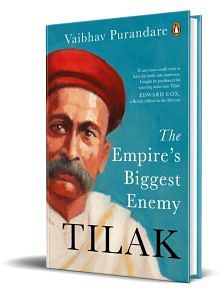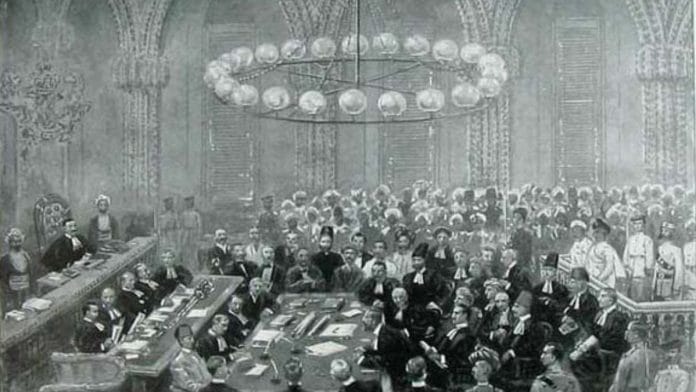Times of India nevertheless took its unrelenting campaign against Tilak forward and advised the government to slap sedition cases against the editor of Kesari and other editors of the native papers. About Tilak, it made clear its opinion that ‘whatever he may say, his disaffection for the government is not superficial and temporary but very deep and of a permanent nature’.
The papers in Britain could scarcely believe that such a man as B.G. Tilak was being allowed to operate freely in India and, horror of horrors, had found a seat not once but twice in the legislature. Morning Post characterized him as ‘one of the most dangerous forces in India’ who ‘for years’ had used his journal ‘to spread the basest fabrications concerning British officials’.
He had ‘produced an outbreak of disorder and insolence’, and now that his ‘deliberate policy’ had ‘borne its natural fruit – outrage – he is reported to have been promoted by those same officials to a position of some honour.’ Since ‘the native’, Post wrote condescendingly of Indians, ‘cannot possibly understand what is popularly described as an “enlightened policy”’ and ‘force appeals to him and, at least, he pays it the tribute of his respect’, such a reward for Tilak would ‘inevitably’ give rise to the belief ‘that Britain is afraid, and that he has been speaking something near the truth in his continual slanders against the rulers of his country’.
More so, ‘he will be looked at as one who has intimidated the Government of India, and so his influence for evil will be increased enormously’. What was the right approach, then? ‘Tilak in prison for sedition-mongering would have formed a vastly more instructive object-lesson to the people of India’, the paper suggested.
While the mild-mannered and liberal Guardian named Tilak’s two papers as among those which had brought ‘vile and reckless charges’ against officials engaged in plague duty, the bearer of imperialistic pride, The Times of London, cautioned the government that there had been no major change ‘in the tone of the native press since the Poona murders’ and that ‘the worst possible effect will be produced if a policy of inaction be persisted in’.
An anonymous letter writer to the London Times, who called himself ‘Scrutatus’, referred to the allegations against plague officials made by Gokhale in the British capital and challenged him to ‘either offer proof of them or confess that the only authority for them is the vague impersonal statements of the vile papers edited by Mr. Tilak and other of Mr Gokhlee’s (sic) personal friends’.
Also read: Why Shivaji’s son came back from Aurangzeb’s Mughal army in less than a year
In the third week of July 1897, Mancherjee Bhownaggree stood up to speak in the House of Commons. Guardian reported that he was, ‘on rising, loudly cheered’, and proceeded to ask the secretary of state for India, Hamilton, ‘if he was aware that in the last two years an annual celebration to stir up disaffection against England among the natives of India had been set on foot under the designation of the Shivajee Accession ceremony’.
Such a ceremony had taken place the previous month in Poona, he said, and ‘one Professor (S.M.) Paranjpe’ had ‘delivered a discourse’ whose ‘substance’ was that ‘in discontent lies the root of prosperity.’ On the same occasion, the Parsi Tory MP said, ‘[A] man named (G. S.) Jinsiwale stated that Shivaji’s ruling passion was a terrible disgust at the humiliation of his country and religion by aliens – that was, the British – and added that he did not see why the saying of the revolutionists in France that they were not murdering men but simply removing the thorns in their way, should not be made applicable to the Deccan.’
Was Hamilton aware, asked Bhownaggree, that ‘Gungadhar Tilak . . . presided at the celebration and made a speech in which he counselled the murder of Europeans and (said)that the mlecchas – that was, the British – had no charter from God to rule India?’ And had any steps been taken by the local authorities to stop such ‘incitement’ to ‘actions as led to the assassinations of Mr Rand and Lt Ayerst within a week of the Shivajee celebration?’
Hamilton replied that he knew of the recently started festival and had read reports of speeches which he said ‘accord with the description given of them’ by the MP, and whether they constituted incitement or not was something the governments of India and Bombay were now looking at.
A month passed. The killers of Rand and Ayerst had not been found. In the last week of July, Tilak proceeded to Bombay for work on a booklet he wished to bring out on the anti-plague measures. He was staying at the home of his lawyer friend Daji Abaji Khare in Girgaum, in the southern part of the city. At 10 p.m. on 27 July 1897, there was a knock at Khare’s door.
The police had come for his guest. Late in the night, Tilak was arrested on charges of sedition for the comments he had made at the Shivaji festival in Poona, which were published in the Kesari on 15 June. He was taken straight to the Esplanade Police Court chowkie, where he was kept in a room till the next morning.
The authorities had chosen the hour of arrest carefully to prevent any public disorder or possible mobilization. Khare, a lawyer, reached the residence of the chief presidency magistrate before midnight to seek bail for Tilak, but it was declined. From there, Khare went to the police court chowkie to tell his friend about the rejection of bail. According to a story since widely circulated, Tilak was fast asleep and had to be woken up. When Khare told him that the magistrate had been a disappointment, Tilak retorted, ‘Why wake me up for this? You could have told me in the morning.’

This excerpt from Vaibhav Purandare’s ‘Tilak: The Empire’s Biggest Enemy’ has been published with permission from Penguin Random House India.






